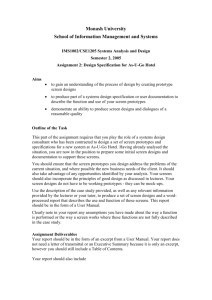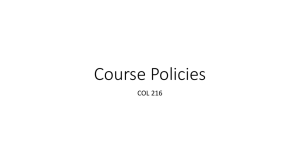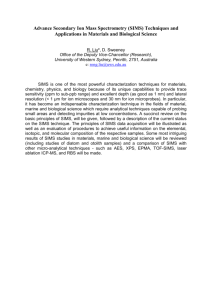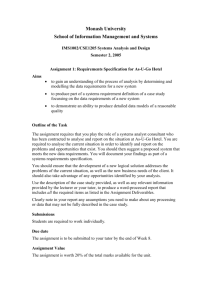Unit Outline - Monash University, Victoria, School of Information
advertisement
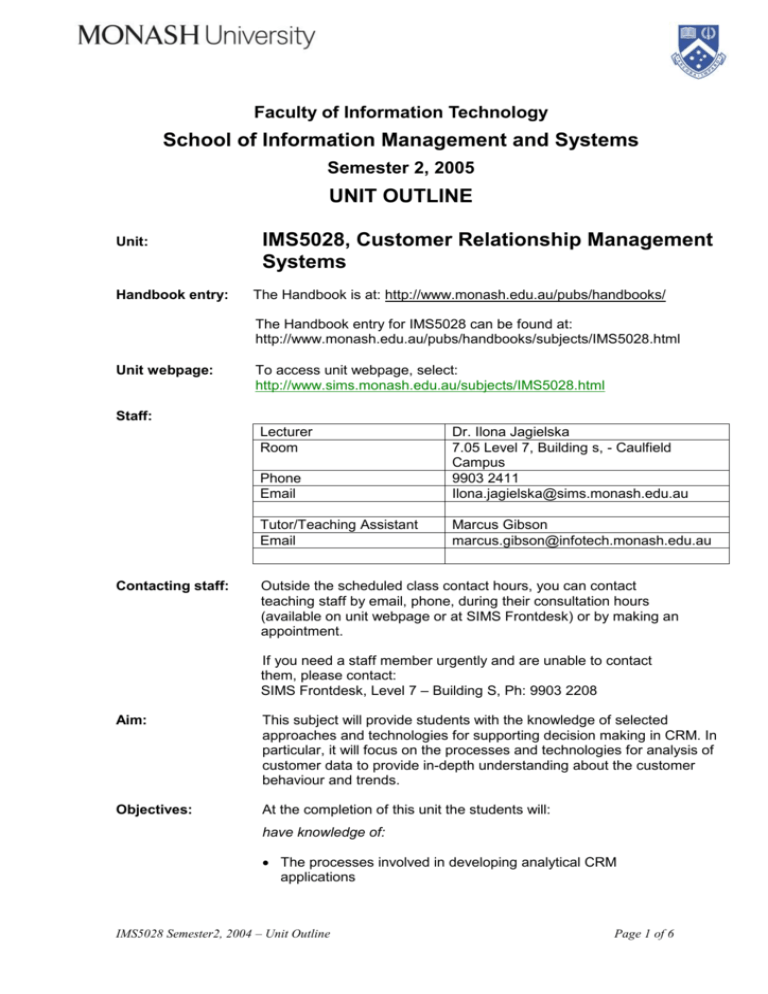
Faculty of Information Technology School of Information Management and Systems Semester 2, 2005 UNIT OUTLINE Unit: Handbook entry: IMS5028, Customer Relationship Management Systems The Handbook is at: http://www.monash.edu.au/pubs/handbooks/ The Handbook entry for IMS5028 can be found at: http://www.monash.edu.au/pubs/handbooks/subjects/IMS5028.html Unit webpage: To access unit webpage, select: http://www.sims.monash.edu.au/subjects/IMS5028.html Staff: Lecturer Room Contacting staff: Phone Email Dr. Ilona Jagielska 7.05 Level 7, Building s, - Caulfield Campus 9903 2411 Ilona.jagielska@sims.monash.edu.au Tutor/Teaching Assistant Email Marcus Gibson marcus.gibson@infotech.monash.edu.au Outside the scheduled class contact hours, you can contact teaching staff by email, phone, during their consultation hours (available on unit webpage or at SIMS Frontdesk) or by making an appointment. If you need a staff member urgently and are unable to contact them, please contact: SIMS Frontdesk, Level 7 – Building S, Ph: 9903 2208 Aim: This subject will provide students with the knowledge of selected approaches and technologies for supporting decision making in CRM. In particular, it will focus on the processes and technologies for analysis of customer data to provide in-depth understanding about the customer behaviour and trends. Objectives: At the completion of this unit the students will: have knowledge of: The processes involved in developing analytical CRM applications IMS5028 Semester2, 2004 – Unit Outline Page 1 of 6 The major methods and technologies including, data warehousing, OLAP, and data mining used for the analysis of customer data Approaches for integrating analytical CRM applications into the broader enterprise decision making process Understanding of: The purpose and role of analytical CRM in organizations The importance of understanding customer behaviour for decision makers The skills to: Using and evaluating tools and techniques for the analysis of customer data Development of Attitudes that lead to: An appreciation of analytical CRM as a combination of business processes and technology, where technology is simply one tool that allows an organisation to achieve strategic goals Realistic expectations of the benefits of the managerial use of information Prerequisite knowledge: IMS9001- Systems Analysis and Design and IMS9003 - Business Information Management Texts: Due to the breadth and novelty of the area, there is no single text that adequately covers the subject. Students are expected to read widely. Additional relevant sources of information for each lecture will be given as appropriate. Prescribed texts: Zikmund R., McLeod R., Gilbert F. Customer Relationship Management, Integrating Marketing Strategy and Information Technology, Wiley,2003 Groth Robert, Data Mining , Building Competitive Advantage, Prentice-Hall Recommended texts: Buttle F., Customer Relationship Management Concepts and Tools, Elsevier, 2004 Berry M., Linoff G., Mastering Data Mining, The Art and Science of Customer Relationship Management, Wiley, 2000 Todman C., Designing a Data Warehouse Supporting Customer Relationship Management, Prentice Hall,2001 Other references: IMS5028 Semester2, 2004 – Unit Outline Page 2 of 6 Berson, A., Smith, S., & Thearling, K. Building Data Mining Applications for CRM. McGraw- Hill, London Kimbal R., Ross M., The Data Warehouse Toolkit, second edition, Wiley, 2002 Study materials: It is essential for all students to have the prescribed textbook listed above. We provide: Downloadable copies of weekly lecture slides from web assignment specifications and further clarification when necessary Unit structure and organisation: Topic No of lectures Introduction 1 Customer relationship management concepts 1 Analytical CRM 1 CRM technologies, CRM data warehouse 2 CRM analytics 1 Data mining applications for CRM 3 CRM in Organisations 1 CRM case studies and product review: student presentations 2 Unit Summary 1 NB. This information is subject to change Workload: This is a six point unit which, according to University guidelines, requires you to spend 12 hours per week (a total of at least 156 hours per semester). The anticipated workload is: 2 hours per week lecture 1 hour per week seminar 7 hours per week preparation and assignment 2 hours per week reading) Assessment: Assignments (50%) and a two hour examination (50%) will be used to assess whether you have achieved the objectives of this subject. The assessment for this unit will be comprised of the following components: IMS5028 Semester2, 2004 – Unit Outline Page 3 of 6 i) Research paper 20 % (due week 6) ii) Case study (or product review) and class exercises iii) Examination (2 hour) Total 30% (due week 11) 50% 100% The formal supervised assessment (2 hour examination) for this unit will be an exam scheduled in the formal examination period following the last week of semester. You are required to be available for the exam and any necessary supplementary assessment procedures until the end of the assessment period. Alternative times for exams will not be approved without a medical certificate for a significant illness, or equivalent evidence. Assignments in this unit are no less important than those of other units. Your inability to manage your time or computing resources will not be accepted as a valid excuse. (Several assignments falling due at the same time is often unavoidable.) Backup copies are required to be made of all assignments and retained for 12 months, in case of loss. Hardware failures are not normally recognised as a valid reason for obtaining an extension or handing in a late assignment. IMS5028 Semester2, 2004 – Unit Outline Page 4 of 6 Assessment Notes 1 Acknowledgment of sources Each time you complete any assessment, please refer to and make yourself familiar with the most current information regarding acknowledgement of sources, plagiarism and academic conduct contained in the SIMS Policy website. http://www.sims.monash.edu.au/policies 2. Assignments 2.1 Standards for presentation All printed assignment work must be word processed and meet the standards set out in the assignment. Refer also to the School of Information Management and Systems guidelines for writing assignments for additional information on presentation standards: http://www.sims.monash.edu.au/resources/style.html 2.2 All assignments must include an appropriate signed SIMS assignment cover page. See the SIMS web site for downloadable (PDF) copies of SIMS assignment cover pages http://www.sims.monash.edu.au/resources/assessment.html 2.3 Extensions If you believe that your assignment will be delayed because of circumstances beyond your control such as illness, you should apply for an extension prior to the due date. All applications for extensions must be made in writing to your lecturer. Medical certificates or other supporting documentation will be required. Late assignments submitted without an approved extension may be accepted (up to one week late) at the discretion of your lecturer, but will be penalised at the rate of 10% of total assignment marks per day (including weekends). Example: Total marks available for the assignment = 100 marks Marks received for the assignment = 70 marks Marks deducted for 2 days late submission (20% of 100) = 20 marks Final mark received for assignment = 50 marks 2.4 Submission of assignments Submission requirements and procedure can be obtained from the subject website, and the assignment documentation. Assignments should be submitted on or before the due date. In the absence of other instructions, all assignments are to be submitted to your tutor during your allocated tutorial. 2.5 Return of assignments Assignments will either be returned in specified tutorials during semester or via the SIMS Frontdesk collection system outside semester. In general, assignments will be returned within two to three weeks of the due date. IMS5028 Semester2, 2004 – Unit Outline Page 5 of 6 3 Student Academic Grievance Procedure If you have a concern or issue about aspects of your assessment or other academic matters, you are encouraged to follow the SIMS Student Academic Grievance Procedure: http://www.sims.monash.edu.au/policies 4. Pass requirements The 40% rule applies to units and determines the final result for a student where the student's performance in either the examination or assignment component of the unit is unsatisfactory. Students need to be aware of the 40% rule which is: In order to pass a unit, a student must gain all of the following: at least 40% of the marks available for the examination component, if any: i.e. the final examination and any tests performed under exam conditions, taken as a whole at least 40% of the marks available for the assignment component: i.e. the assignments and any other assessment tasks (such as presentations) taken as a whole at least 50% of the total marks for the unit Where a student gains less than 40% for either the examination or assignment component, the final result for the unit will be no greater than ‘44-N’. 5. Grades The grades awarded by the Faculty of Information Technology are: Grade Code Marks High Distinction HD 80-100 Distinction D 70-79 Credit C 60-69 Pass P 50-59 Fail N 0-49 Near Pass NP 45-49 (may be awarded by Board of Examiners only) Deferred DEF - Withheld WH - IMS5028 Semester2, 2004 – Unit Outline Page 6 of 6


